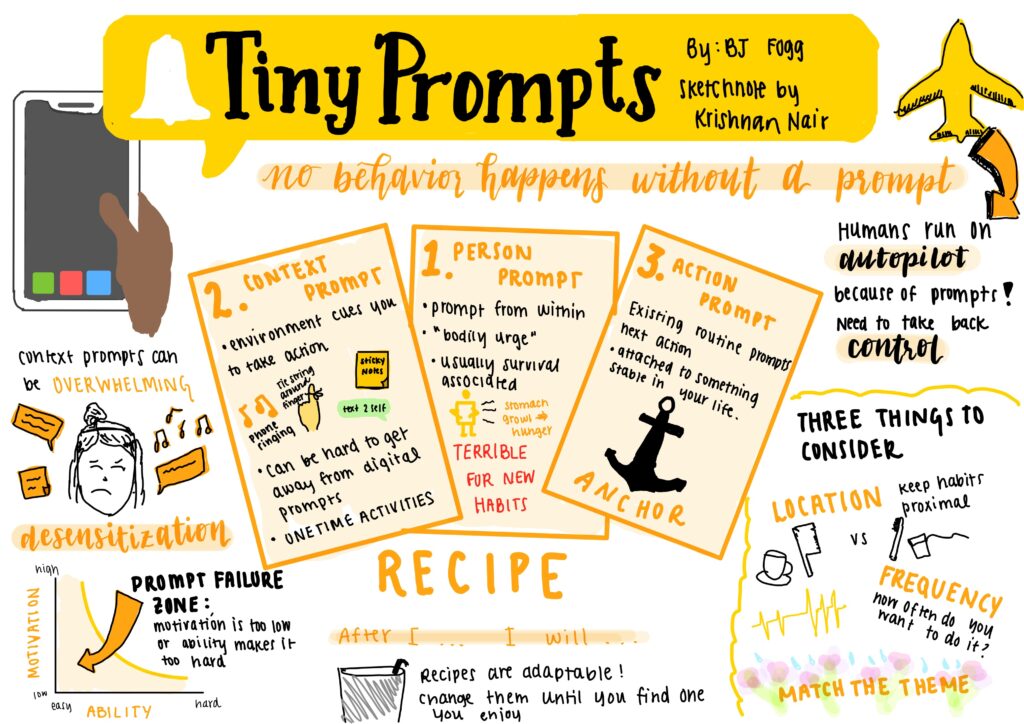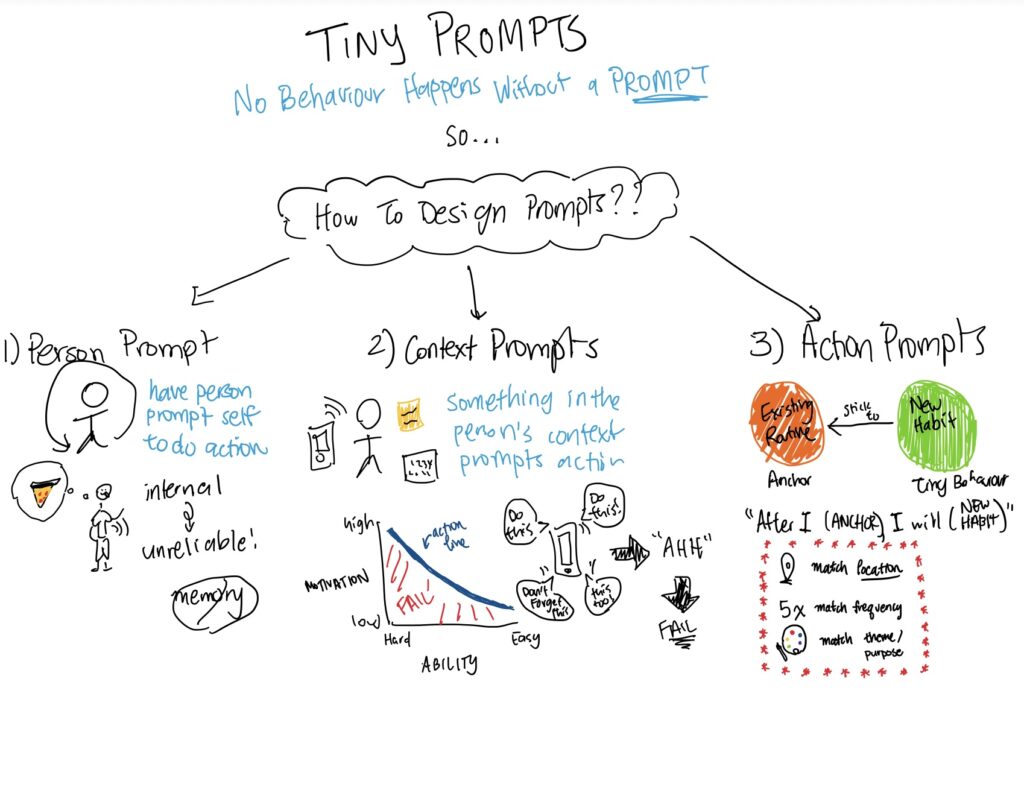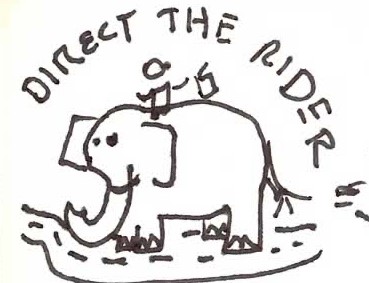Behavior
The behavior I would like to change is getting to bed earlier. While I’ve been disciplined and consistent about waking up at 6:45 on weekdays this quarter, I have not been getting to bed early enough to consistently give myself enough sleep with that wake-up time.
My experience
I began tracking my behavior on Sunday, given I am most interested in changing my behavior on weeknights. I primarily focused on tracking the main events in my day (>30 minutes) as these tend to take up the majority of my time, and I don’t really find myself kept up by lots of small things; usually, there are 1-2 big reasons I’m up late.
This week was a bit weird because of the MLK weekend, so Sunday wasn’t fully a weeknight, but I initially intended to treat it like one. Unfortunately, I was not very successful at getting to sleep. After working out in the morning until noon, getting brunch for an hour, and meeting a friend for two and a half hours, I left for Ikea with a friend to shop for couches and other furniture for The Stanford Daily’s building at 3:30 p.m. Long story short, it took us until 9 p.m., 5 minutes after Ikea closed, to decide what we wanted, set some things up for shipping and get out of there with what we need. Then, it didn’t all fit in the car, but they wouldn’t hold anything or accept returns since the store had closed, so I had to sit and wait with half the stuff for an hour while my friend did a drop-off and drove back. We were starving, so we got dinner, and then motivated to finish something that day after our long and tiring Ikea day, so we stayed up until 1:30 assembling a couch, and I went to bed 15 minutes after that.
I slept in until 10 the next morning and went back to Ikea at noon, this time with a truck, to pick up the remaining things we ordered. We brought those back by 2:30 p.m. and assembled until 5:30 when I had some Stanford Daily meetings until 9:00 p.m. and dinner in the middle of all of that for 10 minutes. Then, I went back to my dorm and chatted with my roommate while trying unproductively to work on some homework until 11:20 p.m. when I went to bed.
The next morning, Tuesday, I woke up at 6:45 and worked on homework mostly productively until 9:00 when I made breakfast. I then went to classes back to back until noon, when I drove to San Francisco to get lunch with a friend. I arrived back on campus at 4:15 p.m. due to missing a few turns and worked unproductively on homework until getting dinner from 6 to 6:30. I worked on my Math PSET from 6:30 to 9:30 p.m. going back to my dorm after I finished it. I worked on my Phonetics PSET from 9:45 to 11:45 but mostly just complained to my roommate that I didn’t want to do it. I worked on it very productively from 11:45 until 1:30 a.m. when I went to bed. I woke up at 6:45 a.m. Wednesday to finish it and this assignment before my class at 8:30 a.m.
This set of days probably wasn’t entirely representative because of the long weekend, Ikea fiasco, and Ikea preventing me from getting an earlier start to some of my PSETs, but the pattern of “I intend to work on something and then I do it unproductively so I get less done, so I have to stay up late” I’ve noticed is very consistent, and that appeared a few times in this tracking. In the next section, I’ll unpack what I think causes that pattern.
Connection circle
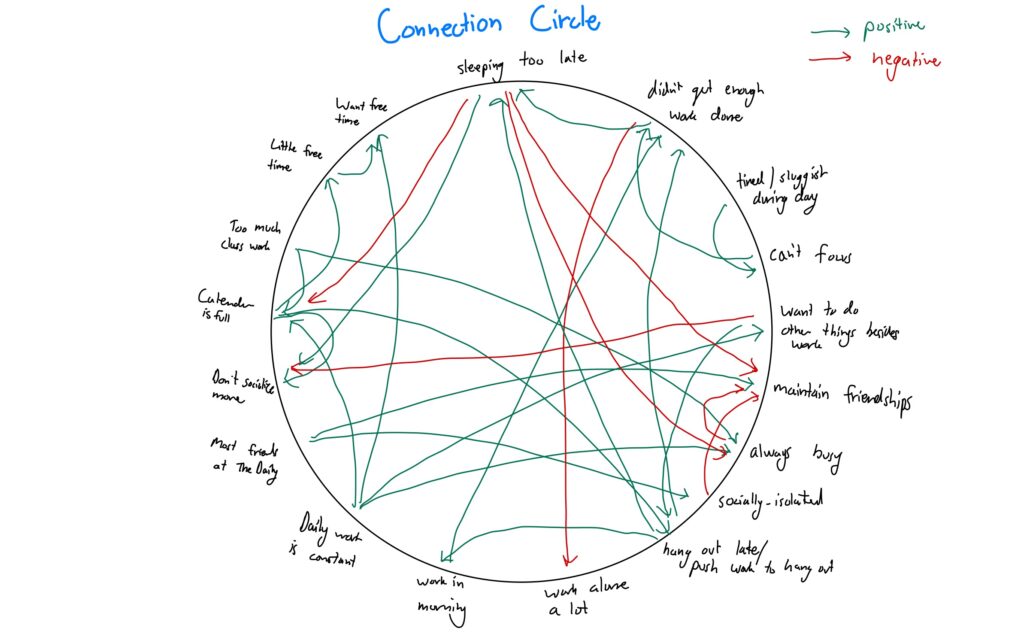
The connection circle showed me how a lot of my issues with sleeping too late have to do with my ability to work on homework productively, and a lot of the reason I don’t do that is that I’m tired. Go figure. However, a confounding effect I discovered is that I often stay up late when I’m trying to hang out with friends or because I’m craving social connection and so I could potentially mitigate the initial cause of my tiredness by focusing on social connection earlier in the day, even if it takes time away from other activities. I also might be better off better designating when I want to work and when I don’t want to, as I do a lot of “sort of work” where I’m in the working mindset and not having fun, but also goofing off and not being productive. If I could eliminate some of this time, I might be able to finish things a lot faster and not feel so busy, which was something that took away time for social activities and also contributed to always feeling like my calendar was packed which made me feel like I couldn’t hang out with friends.
Fishbone diagram
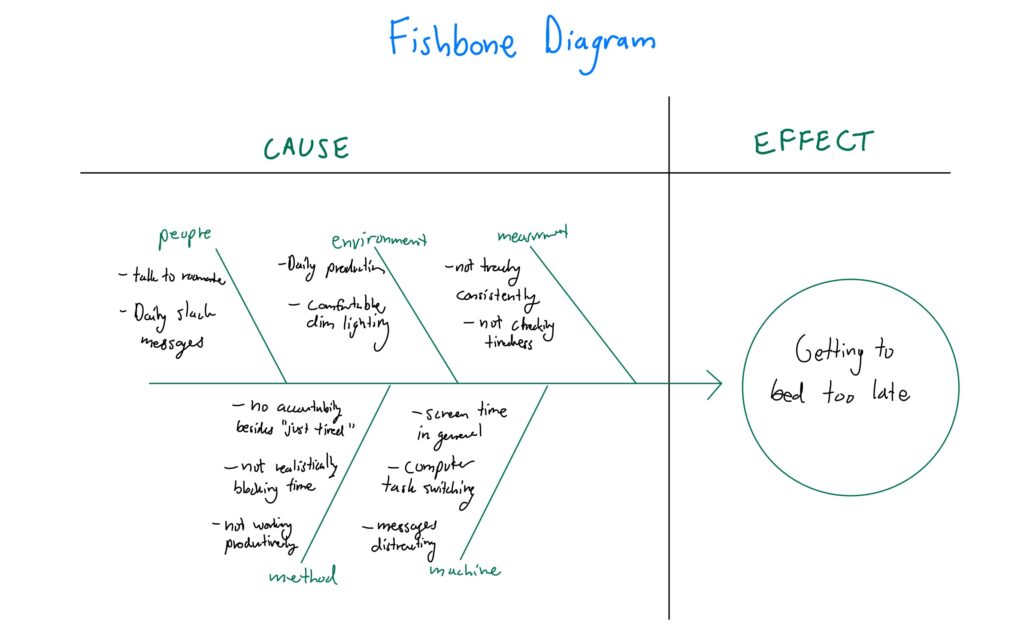
The fishbone diagram helped me identify some of the key factors present when I’m not going to sleep early enough. For example, I realized that I often have very comfortable dim lighting in the room where I do my homework, so I don’t really feel like I’m staying up too late and losing track of time. I also realized that I don’t hold myself accountable for sleeping through any means besides “being tired” which probably isn’t ideal. I also realized that my screen time probably contributes to me not feeling tired as I’m often doing homework late at night.
What I’d do differently next time
If I were to do this exercise again, I’d probably choose a different week or set of days that had some more normal scheduling. Part of the reason I was so demotivated on homework this week was that I gave up my whole weekend for Ikea and then still had a lot to do. If I had been able to get through more this weekend, I would probably have been better able to determine the factors that kept me up late. In addition, I would like to do a better job tracking the finer details of what is making my work unproductive to see if I can identify trends there. Finally, it would be good to understand more about what types of social things specifically tend to keep me up or push things to my evenings to see what triggers them, if they’re movable, and why or why not.


